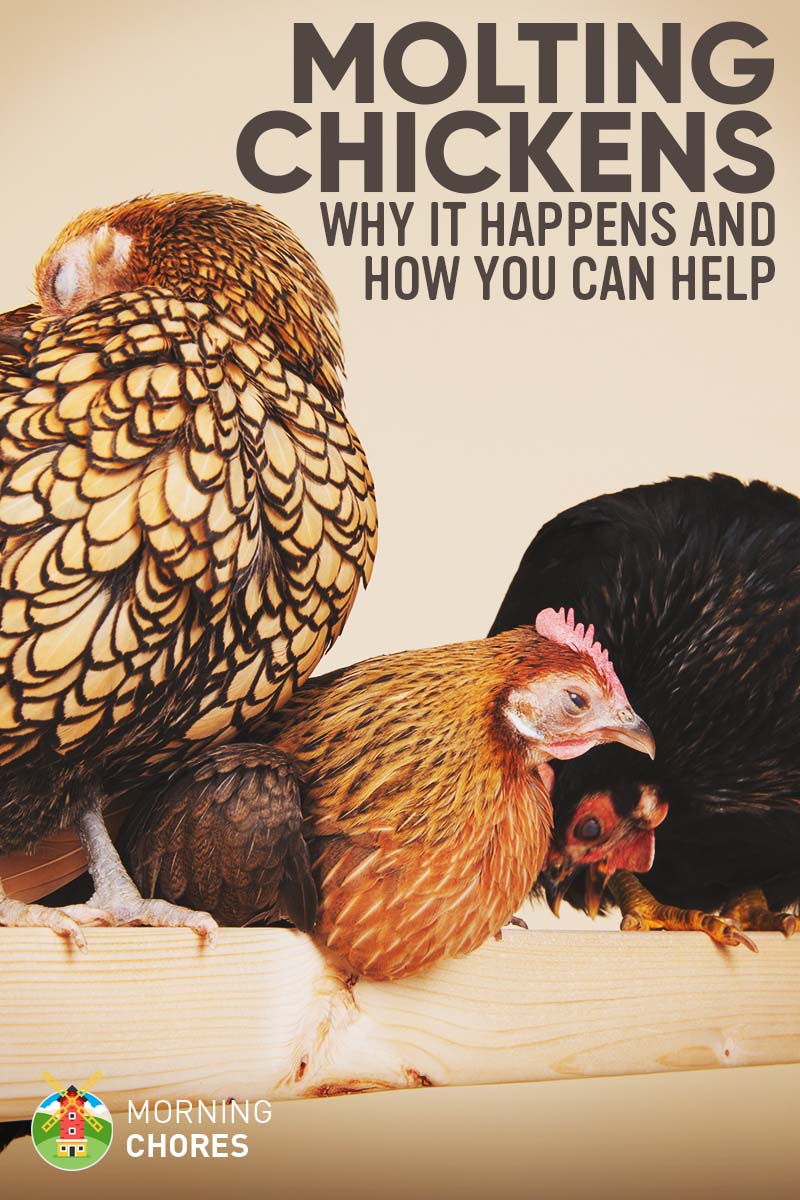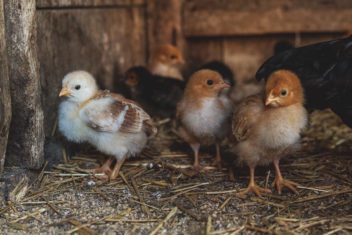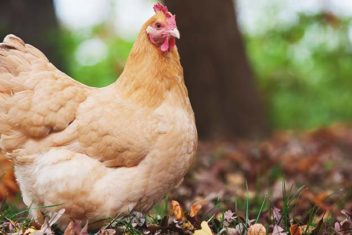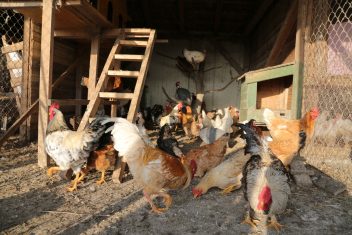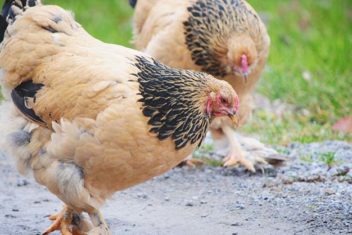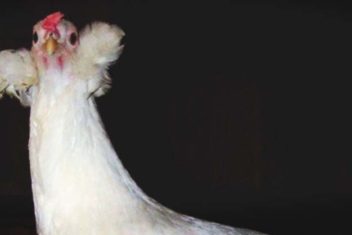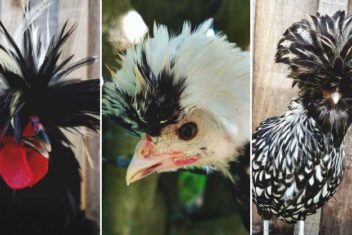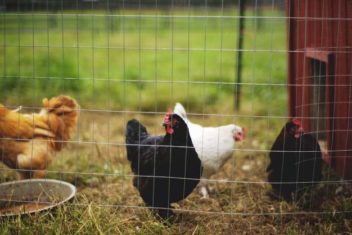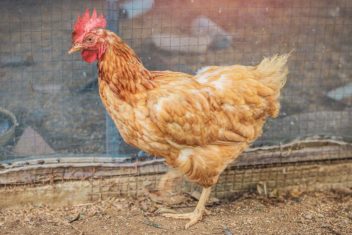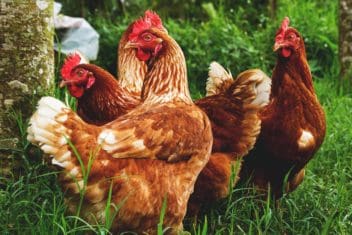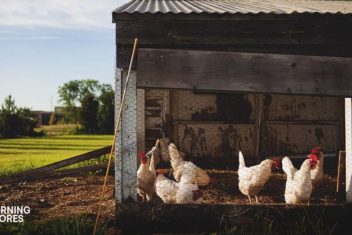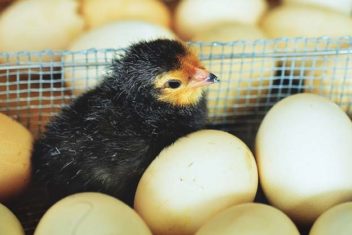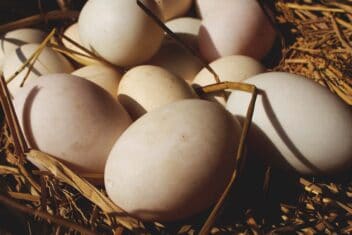Have you ever seen a molting chicken?
It is one of the saddest/oddest things you will probably encounter in your time as a chicken keeper. At least, I know it was for me. The first time I saw my chickens losing their feathers I was afraid something had gone horribly wrong.
Today, I want to talk to you about molting. I’d like to explain to you what it is, why it happens, when it happens, how you can prevent it, and should you try to prevent it.
Here are the details on molting and your chickens:
What Is Molting?
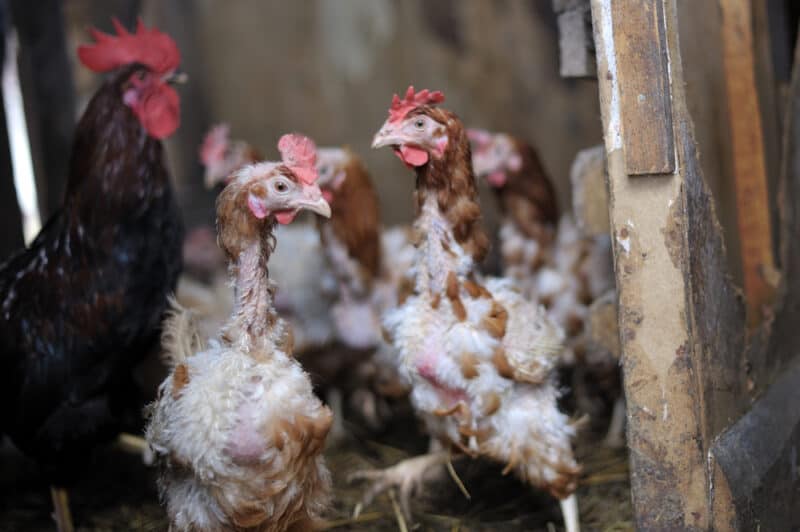
Molting is a process that your chickens go through. They will begin going through this process yearly after your birds reach the age of 12-18 months old. This happens when their body goes through some hormonal changes which allow their feathers to fall out and make room for new feathers.
When you see your birds going through molting, it might alarm you at first. However, don’t fret. Usually, the bird’s feathers return in about 4-12 weeks, and they are back to normal with beautiful new foliage.
Plus, when your birds molt and their new feathers come on you might actually end up with a bird that looks different because their new feathers can be a different color.
When Does It Happen?
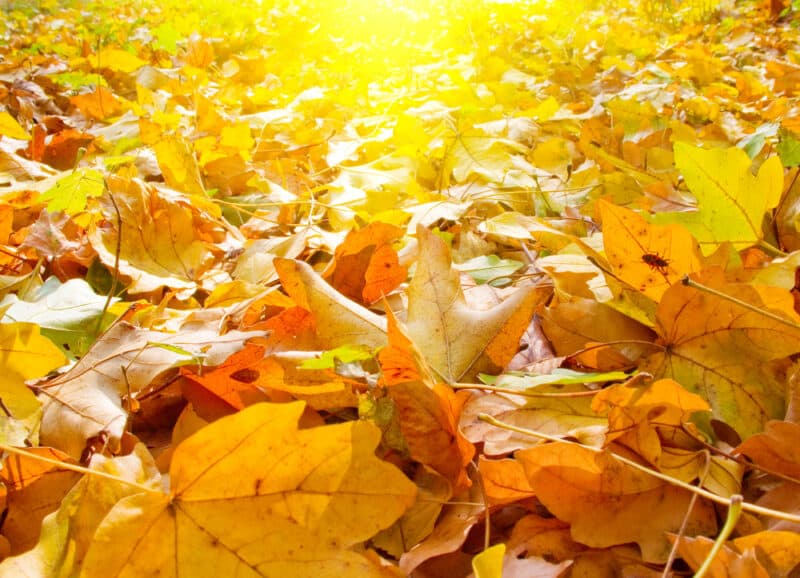
Molting takes place usually towards the end of summer or during fall. You will begin to notice that your birds are in molt because not only will their feathers fall out, but they will also stop laying while they are going through this process.
It is believed that the shorter days are what signals their bodies to make these hormonal changes which bring about molt. That is why molting usually happens around the fall due to the shortening of daylight hours.
When you begin to see the sun setting earlier and fewer eggs in your nesting boxes, then you should begin to start looking for chickens that are molting because that is probably what is going on inside your hen house.
However, it should be noted that hens molt every year after they reach the age of 12-18 months, and molting usually lasts about 8 weeks. Yet, some molts are shorter at around 4 weeks, while some last longer at around 12 weeks.
Why Do Chickens Molt?
As mentioned earlier, birds molt because of a hormonal change in their bodies. The actual reason for this hormonal change is because the bird’s body knows it is time to restore what is broken.
As a human, our bodies can usually repair themselves by simply fixing what is broken. Think about a fingernail. When we break one, we don’t lose our whole nail in order for the broken part to grow back. No, our bodies just pick up right where the nail was broken and brings about regrowth.
Well, chickens don’t have that luxury.
When their feathers begin to get old or they break, their bodies can’t just allow them to refresh right where they are at. Instead, their feathers must fall out completely so that way new growth can come. In the chickens’ case, it is new feathers that can come out of where they lost their old dead ones.
However, the actual reason chickens do this is so they can stay in tip-top shape. With old feathers, they can’t fly as well. So this is just their natural way of being in the best shape that they can be for their survival.
However, you might still be wondering why the birds don’t lay eggs while in molt. Well, the answer is quite simple. When the birds go into molt, their bodies require every little resource they have to regrow everything. If you think about it, their bodies basically rejuvenate themselves in a matter of weeks. That has to take a lot of nutrients and energy to complete this process in such a short period of time.
That is why chickens don’t lay eggs while they’re molting. They don’t have enough nutrients left during this time to lay eggs and rebuild their bodies simultaneously.
How To Stop Molt
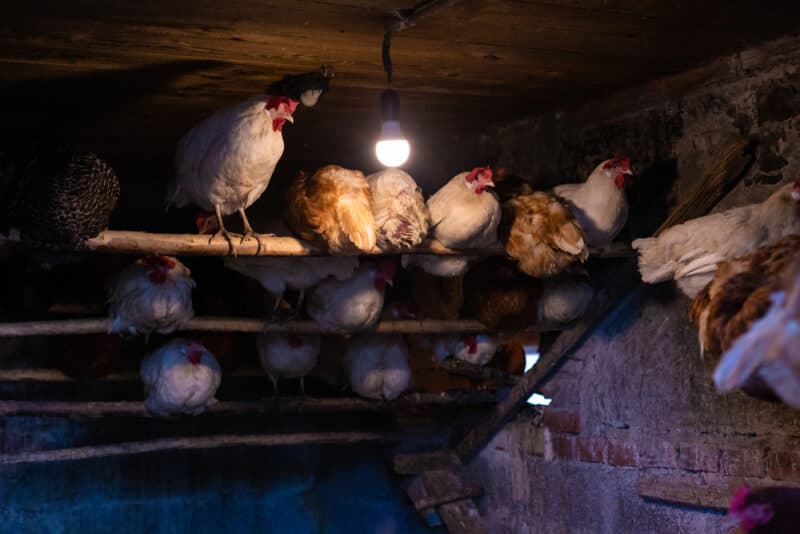
When we first got into chicken keeping, we were as green as they come. We had no idea about molt and our first chickens were older chickens so they had reached the age of molting. Plus, let’s be real for a moment. As we get older our bodies need a little extra repair from time to time.
I began to notice that they were laying fewer eggs, but I had read enough to know that this could happen as the days got shorter because of the lack of sunlight. Chickens don’t wake up as early during the winter (mine are actually quite lazy!) so they don’t have enough time to get their systems jump-started to lay an egg.
Which you could imagine my surprise when I went out to the coop one morning to find no eggs and some seriously funny looking chickens. That is when I panicked because I thought all of my chickens had caught some horrid disease and were going to die.
Then I calmed down enough to get to the internet to realize it was molting. I watched them curiously over the days following only to be relieved to see that their feathers did indeed come back and that my birds were more beautiful and laying better than before.
However, it was a few months later when talking to one of our chicken keeping friends that he told me I could actually stop molting.
Naturally, my ears perked up to that possibility. He said all I had to do was to put a light out in the coop and place it on an automatic timer. That way they would continue to think that it was summer, and they would continue to lay.
So if you are in desperate need of eggs this winter, this method should work for your hens. Just remember to use an ordinary light (NOT a heat lamp) as they cause fires and are generally not safe for your flock.
Should You Prevent Molting?
I’m going to tell you upfront that preventing chicken molting is a personal preference. I will not pressure you to go one way or the other. It is your flock and ultimately your decision.
However, I will share with you both sides of the argument and what I have chosen to go with.
First, those that are for stopping molting do so because they don’t want their birds to quit laying nor do they want their birds to get sick.
Let’s be honest, if you are trying to live a sustainable lifestyle, it throws a kink in things when the animals you depend upon for food aren’t providing you with food. A person could starve under those conditions.
Plus, your birds are more susceptible to illness when in molt. The reason is that their bodies are working so hard to regenerate themselves that their immune systems are weaker. It basically like us. When we are working really hard, we often get sick. The reason is that our bodies are exhausted so our immune systems are weaker.
Well, your birds aren’t so different. Not every one that keeps their birds from molt is heartless, they are just people who don’t want to give up eggs. They do so out of protection for their birds and also because they genuinely need the eggs for their survival.
Second, those that allow their birds to molt usually do so because it is natural. They want their birds to be at their best which requires them to go through molting and rejuvenate their bodies.
Though this does put them at greater risk of illness during those weeks of molt. Ultimately, molt makes them stronger, healthier layers for the rest of the year. It also gives them an edge on protecting themselves from predators because they are able to fly with their beautiful new feathered wings. (I use the term fly loosely. We all know chickens do more of a flighty hop.)
Finally, with all of that being said, I have actually chosen to allow my birds to go through the molting process. I don’t like going without eggs for a few weeks, and I’ve actually had birds fall ill during their molting period.
Even so, for me, I try to keep my flock as natural as possible. So I let them do what their bodies were naturally designed to do.
However, since I have flocks of different ages, all of my birds don’t molt at the same time. Last year I had a lot of my flock go through molt as they were older birds. Whereas this year, I only had one bird molt because I introduced new birds to the flock this past spring and culled off some of my older birds this fall.
However, the one bird that did molt this year taught me a very valuable lesson. She looked really old and tired before molting. I was actually wondering if I shouldn’t just put her out of her misery so she wouldn’t suffer going through winter.
Then I decided to be patient. She went through the molting process and now she is a gorgeous and lively bird again. I guess her body was in serious need of some rejuvenation.
What Should You Expect With Birds In Molt?
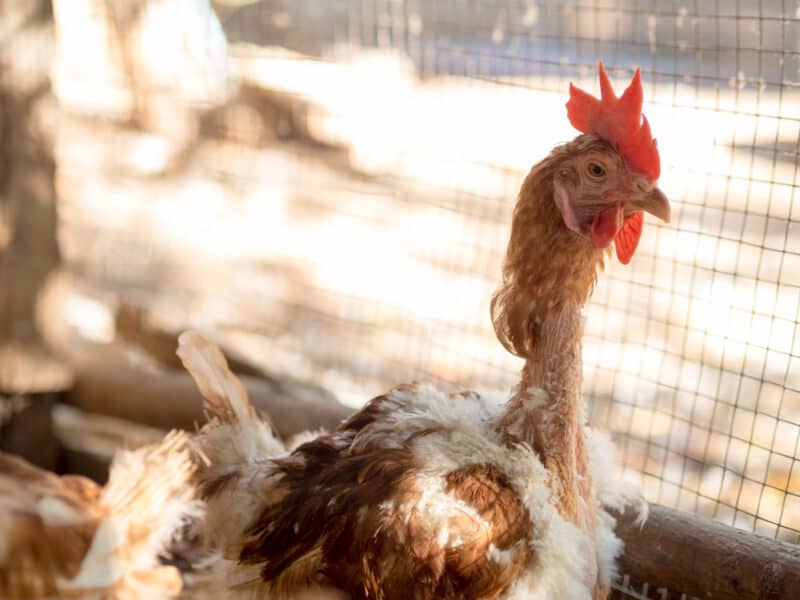
When fall starts coming around you should pay close attention to your flock. I always keep an extra close eye on my flock during the colder months as it is the time of year when they are more prone to respiratory illness (at least I have found this to be true in my experience.)
As you are watching your flock, you will probably begin to see feathers lying around the coop. You will notice that certain chickens will lose feathers faster than others, and they will actually begin to look like they are going bald.
However, some will just lose splotchy spots of feathers. You will begin to get no eggs from the birds that are molting. It has also been reported that some chickens get emotional while in molt.
Basically, what that means is that they don’t act like themselves. They might stay more secluded by choice. They might be flightier than usual. Some might even develop an attitude. It is no different than when our bodies are flooded with hormones. We aren’t exactly sure how to act either so try to be patient with your flock during this time.
How To Help Your Flock In Molt?
The best way to help your flock while in molt is to keep their stress levels as low as possible. They are going through a rough time physically so keeping them as calm as possible is key to them getting back to normal.
Second, reduce the handling of your birds during this time. Their bodies have no protective feathers in some places which means their skin is readily available to be injured. Plus, handling stresses chickens out some times.
Finally, increase their protein levels. Protein helps our bodies rebuild. It is no different for chickens. During a time when their bodies are working overtime to rejuvenate themselves, it is important to give them extra of that important building block.
Well, that is all of the ‘molting’ information I have for you. I hope it helps you to understand what is taking place in your flock.
And hopefully, it will help you not be so shocked (like I was) when you walk into your coop one day and find your chickens have gone bald.
